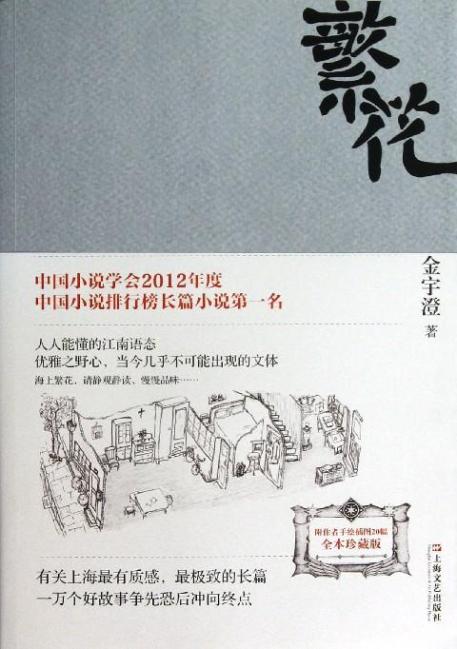Blossoms: A story written with Shanghai accent
Written by Li Shiyu and voiced by Liu Min, this bookreview was originally aired on April 15,2014.
Using various dialects in literature is a common phenomenon. "The Sing-song Girls of Shanghai" ,or Hai Shang Hua Lie Zhuan,is China's first dialectal fiction. The heavy use of Shanghai dialect in the novel not only captures the mood and ambiance of China in the late 19th century, but also endows the work a sense of authenticity and regional flavor. Its uniqueness even prompted directors to make a film adaptation of the book.
However, since Shanghai dialect is not mutually intelligible with other varieties of Chinese and the government has chosen Mandarin as Chinese mainland's official language, fiction written in this distinctively southern dialect have gradually disappeared since 1950.
![In Beijing,writer Jin Yucheng participates in a roundtable discussion of the theatrical adaptation of his novel "Fan Hua" on June 5,2018.[Photo:Courtesy of SMG]](https://p3crires.cri.cn/01dcri/images/zhycms_chinaplus/20180608/2d8f6177-af57-495c-8b3c-31b782960268.jpg?x-oss-process=image/resize,w_650)
In Beijing, writer Jin Yucheng participates in a roundtable discussion of the theatrical adaptation of his novel "Fan Hua" on June 5,2018. [Photo: Courtesy of SMG]
Jin Yucheng, a native Shanghainese and senior editor for the magazine Shanghai Literature, is determined to rejuvenate his mother tongue.
"Things happened just by chance. I have a friend who always posts topics in an online forum and he asks me to check them. The website is dedicated to Shanghainese and people post about everything in the Shanghai dialect. I think I can pen down the lives of common people living in Shanghai on this website, as well." When asked the inspiration of his writing, the author answers.
Everyday, Jin Yucheng posted 100 to 200 words entries to the website. Written in Shanghai dialect, Jin's posts recorded real people and real events he has witnessed or heard from friends. Gradually, since his posts became popular, Jin decided to adapt them into a 350 thousand-word novel entitled: "Blossoms", or in Chinese "Fan Hua".

In 2015, Jin Yucheng's debut novel "Blossoms" or "Fan Hua" in Chinese won the prestigous Mao Dun Literary Award.
Depicting chores and trifles of urban life, such as grocery shopping and hosting a dinner party, "Blossoms" provides a vivid image of the daily life of ordinary Shanghai people. Focusing on a hundred characters, and several main ones, the whole story is carried out over two time-lines: from the 1960s to the mid-1970s, the end of the Cultural Revolution; and from the 1980s to the start of the 21st century. As the two time periods alternate, the book unveils the two faces of the city: the Shanghai of old and the modernized metropolis it is today.
Impassioned plots or dramatic moments are lost inside the book; heroes and villains disappear as well. Merely following the street life of everyman, the author digs into the national character of China and the thrilling changes that have happened in the country during the past 40 years. The profundity of the novel helped it win Shi Naian Literature Prize, one of the top literary awards in China for saga novels. "Blossoms" is also named as the country's top work of fiction by the China Academy of Fiction.
![The photo shows a scene from the stage adaptation of the novel "Blossoms." [Photo:SMG]](https://p2crires.cri.cn/01dcri/images/zhycms_chinaplus/20180608/95af2b1b-3dcd-4020-ae12-65103ae7c922.jpg?x-oss-process=image/resize,w_650)
The photo shows a scene from the stage adaptation of the novel "Blossoms." [Photo: Courtesy of SMG]
Talking about the success of "Blossoms", Jin emphasizes that novelists should not dramatize or sermonize their works; instead, everything should be kept simple.
"In terms of the essence of writing novels, everyone was telling stories in the beginning, right? But after we write numerous novels, we start to believe that writing is an important matter, or in other words, a noble and high-end thing to do. But, actually, if we could get back to the initial purpose of writing about life, that would be really nice." He says.
Without any psychological description to portray these characters, Jin narrated the story by using short sentences and dialogue without any quotation marks, which may remind his reader of traditional folk literature from ancient China.
Moreover, in order to shatter the linguistic limitations of the Shanghai dialect, Jin adjusted the language to be more fluent and understandable for readers living outside Shanghai.
"It took great energy to transform the language. First of all, I had to remove all the onomatopoeias or words void of sense in the Shanghai dialect. " Jin says during his writing, he took out words and sentences that might be too confusing for northerners to understand.
![A namesake stage adaptation is ready to grace the Beijing Tianqiao Performing Arts Center from June 21 to 24,2018. [Poster:Courtesy of SMG]](https://p3crires.cri.cn/01dcri/images/zhycms_chinaplus/20180608/88c6d46f-8a02-4bf5-97a2-468e7abd028a.png?x-oss-process=image/resize,w_650)
If you find it difficult to understand certain nuances and quirks of the novel, a namesake stage adaptation is ready to grace the Beijing Tianqiao Performing Arts Center from June 21 to 24, 2018. [Poster: Courtesy of SMG]
Mao Jian, a writer and film critic living in Shanghai, compliments Jin's re-structuring of the Shanghai dialect:"'Blossoms' is no longer a novel about Shanghai nor a work set in Shanghai; its cultural influence could radiate to a broader range."
Inside the book, Jin also added dozens of illustrations and maps drew all by himself. By doing so, he hopes readers around the country could get a better understanding of the real Shanghai.

